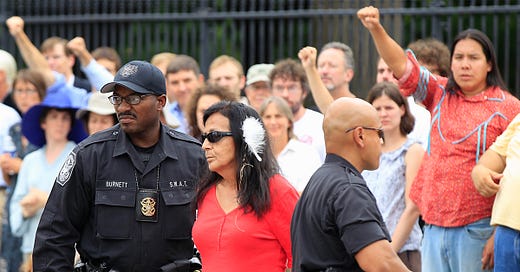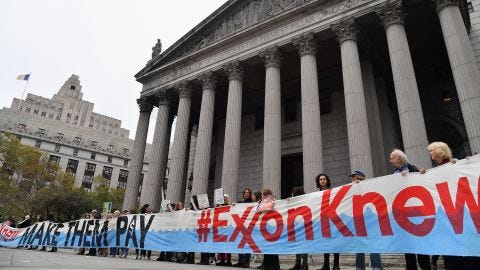Refugia Newsletter 32
Fossil fuel falsehoods, a history of climate activism, green education, and antics of the magi
Refugia News
Happy new year! I hope the year is off to a promising start for you. At Calvin University, we launched our new semester this week, and by Tuesday already I was giving myself a little lecture: “You need to buck up, girl, and get your stamina back!” I guess I did, but I’m still very glad we’ve reached the weekend.
Besides teaching some fantastic Calvin students, I have a busy schedule of Refugia-Faith-related events coming up. You are of course invited to join in as you are able. This week already, the Christian Reformed Church Climate Witness Project offered a “Climate Huddle,” where readers of the book gathered online, and I got to converse with the wonderful hosts and respond to reader questions. Next week I’m honored to be a keynote speaker at the Evangelical Environmental Network’s Summit 2023, an online gathering that will also feature US EPA chief Michael Regan.
So many good people in this work. That’s the best part of doing these gigs: meeting amazing people. I’ll keep you posted on events coming up in February and March, too.
This Week in Climate News
It’s been gratifying to watch the “climateratti” (is that a word? I just made it up) look back on 2022 with relief and appreciation for major federal legislative victories in the US, most especially the Inflation Reduction Act. We’re starting 2023 with some great momentum. But of course, one can always rely on a steady flow of bummer climate news.
I’m going to ignore the kerfuffle this week about gas stoves. Let’s let the hysterics settle before tackling that one, shall we?
Instead, I think we have to acknowledge the horrid-but-not-surprising new report about Exxon’s decades of lying. The report gives deeper detail supporting the claim that “Exxon knew.” Exxon has known since the 1970s, with ample scientific demonstration from their own scientists, that burning fossil fuels causes climate change. Their internal studies produced models predicting quite accurately what has in fact happened. Exxon knew, and they deliberately lied about what they knew in order to keep making money. Here’s Bill McKibben’s quick summary of the report, here’s the article in the New York Times, and here’s the study itself, published in Science.
Angela Weiss/AFP/Getty Images, appearing on https://www.cnn.com/2023/01/12/business/exxon-climate-models-global-warming/index.html
I’ll borrow the quote cited in McKibben’s newsletter, in the words of the study’s lead author, Geoffrey Supran:
“This is the nail-in-the-coffin of Exxon Mobil’s claims that it has been falsely accused of climate malfeasance. Our analysis shows that ExxonMobil’s own data contradicted its public statements, which included exaggerating uncertainties, criticizing climate models, mythologizing global cooling, and feigning ignorance about when—or if—human-caused global would be measurable.” [emphasis added]
Moreover (yes, there’s more), Amy Westervelt has summarized the results of the recent House Oversight Committee investigation, which analyzed subpoenaed internal documents to reveal the fossil fuel industry’s ongoing, persistent, and deliberate efforts to deceive the public about the real dangers of their products. Westervelt writes:
“Taken together, they [the documents] reveal that the industry’s approach on climate really hasn’t changed since scientists first started warning that the burning of fossil fuels was becoming a problem: push “solutions” that keep fossil fuels profitable, downplay climate impacts, overstate the industry’s commitments, and bully the media if they don’t stay on message. It’s the same five-step plan, deployed to the same end: preserving power, subsidies, and social license.” [emphasis added]
Here’s a shorter summary by Westervelt, and here’s her interview on the Drilled podcast with Rep. Ro Khanna on the committee’s work.
It’s hard to fathom this kind of decades-long, intentional deception, especially considering what it means for the entire globe. I’m not afraid to name it for what it is: it’s evil.
Deeper Dive
To balance the moral darkness of that story, let’s turn our attention to a pair of excellent pieces on the effectiveness of climate action.
This little article by Adam Aron in Fast Company examines the problem of inaction. Why do people say they worry about climate change still do nothing about it? The reasons boil down to the belief that they have no power, that nothing they do matters. But it’s not true! Aron writes: “Research and history suggest that local action is more powerful than many people realize.” The piece is a convincing little defense of acting locally, in one’s county, city, and region.
This longer piece by Juliet Grable in Sierra presents an excellent summation of climate action since 1988. This one is a must-read! For me, the article helpfully connected a lot of dots among pipeline protests, divestment campaigns, legislative initiatives, and it helped explain how various groups interact, both grassroots folks and “Big Green” groups like the Sierra Club. I knew about all this stuff—sort of?—but the article creates a helpful timeline and shows the connections among groups and events.
Two big takeways for me.
Wow, all these actions are so recent! The march across Vermont that pre-launched 350.org was only 15 years ago. Greta Thunberg only appeared on the scene in 2018! So much incredible progress in such a short time.
Activism works. And the networks built among groups are now set to create influence for the better on an unprecedented scale.
Here’s one moment from the piece that represents the broader gist:
“In truth, the IRA wouldn’t have happened without the climate movement. That we finally have meaningful climate policy is a testament to the persistence, smart strategizing, and rowdiness of millions of activists. It’s also a sign that the fossil fuel industry’s stranglehold on Congress is not as total as it once was.”
Lakota activist Debra White Plume is arrested at the White House in 2011 while demanding that President Obama deny the Keystone XL Pipeline. | Photo by Luis M. Avarez/AP
Refugia Sighting
A quick shout-out today to the educational innovators and dreamers who are working in the field of green education to inspire the next generation. In this nice little piece in Outside magazine, author Lauren Matison “identified five programs across the U.S. that have proven track records of igniting kids’ interest in the natural world and inspiring them to fight for outdoor equity and climate justice in their own backyards.”
Milwaukee, LA, South Carolina, New Mexico, Colorado: the variety and reach is impresssive.
The Way-Back Machine
Epiphany was January 6, so we can still consider this Epiphany season, and thus anything magi-related remains appropriate. My regular writing rotation at the Reformed Journal scheduled me on Christmas Eve this year. The last time I was scheduled for that auspicious day, I wrote a fairly serious prayer. This time, I decided to have a little fun, so I composed a kooky but poignant (I think?) drama about the magi, complete with pop culture jokes, cross-dressing, and a rather charming camel character.







